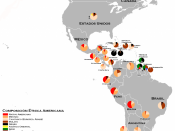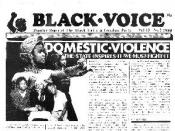Paul Gilroy, in chapter 5 of his book There Ain't No Black in the Union Jack, touches upon many important concepts that relate to the topic of African Diaspora. I would like to discuss two of the themes which interested me the most. Gilroy gives a great deal of talking to the idea of black power and how this transposes into a strong black nationalism. He also focuses much of his attention to the effects of music on culture, and importantly on politics.
Black culture has definitely been incorporated into all of the societies which Africans have dispersed to. Gilroy focuses on the distinct culture, which has been "actively made and remade" in Britain. Black people have been made apart of new nations through the process of cultural syncretism. Their music, clothes, political views, dancing and language have all been worked, in some way, into the nations which they have moved to.
Having dispersed throughout the world, many black people began to feel out of touch with African, so they began a black power movement which drew a connection between black America and Britain and African Culture.
Black nationalism developed to preserve a culture which felt that they had no authentic culture of its own. A need for collective solidarity and unity was the goal, as well as to have an identification with ancestors. Black nationalists were encouraged to think, talk, act, create, buy, vote and live black. In this way, ties were created with a culture that could make them feel connected to their roots.
Music was one of the key elements of the black power movement. It had an intense political message which echoed the views of many Africans of the time. Hip-Hop and reggae cultures created resistance in a culture that they were not feeling a direct part of. There was a huge black voice when it came to elections also. Artists would play for their candidates in hopes to gain other black votes. Music created another tie back to Africa in that the artists could use their voice to send political messages to other black people.





